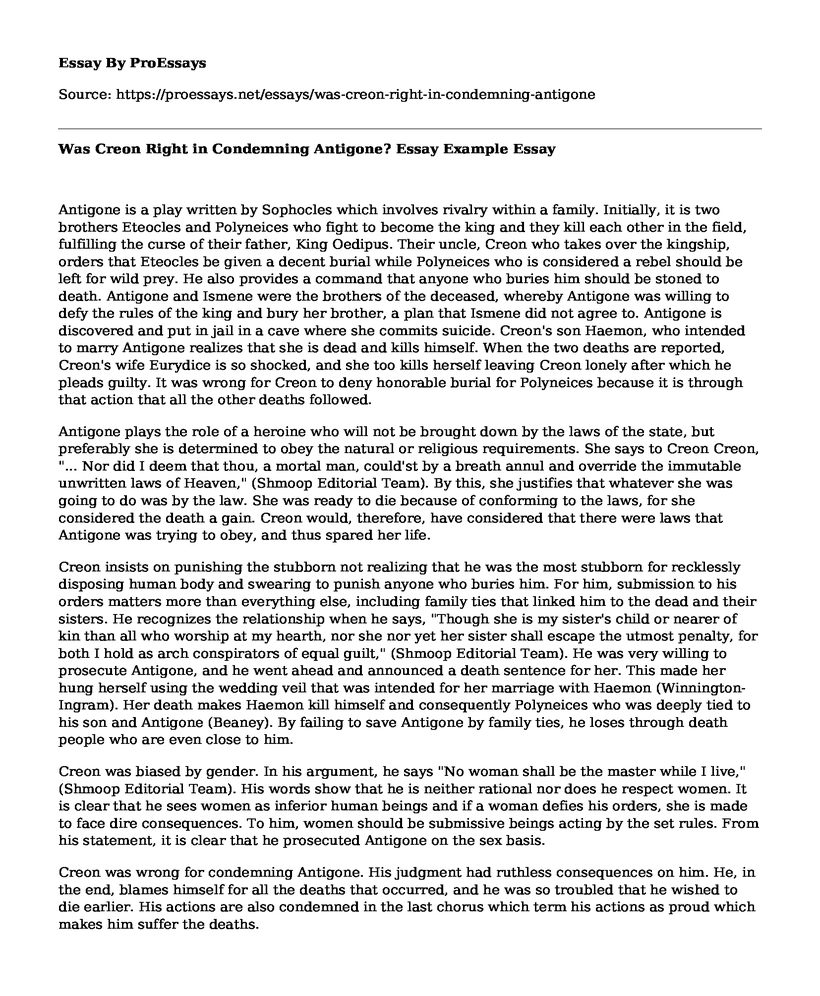Antigone is a play written by Sophocles which involves rivalry within a family. Initially, it is two brothers Eteocles and Polyneices who fight to become the king and they kill each other in the field, fulfilling the curse of their father, King Oedipus. Their uncle, Creon who takes over the kingship, orders that Eteocles be given a decent burial while Polyneices who is considered a rebel should be left for wild prey. He also provides a command that anyone who buries him should be stoned to death. Antigone and Ismene were the brothers of the deceased, whereby Antigone was willing to defy the rules of the king and bury her brother, a plan that Ismene did not agree to. Antigone is discovered and put in jail in a cave where she commits suicide. Creon's son Haemon, who intended to marry Antigone realizes that she is dead and kills himself. When the two deaths are reported, Creon's wife Eurydice is so shocked, and she too kills herself leaving Creon lonely after which he pleads guilty. It was wrong for Creon to deny honorable burial for Polyneices because it is through that action that all the other deaths followed.
Antigone plays the role of a heroine who will not be brought down by the laws of the state, but preferably she is determined to obey the natural or religious requirements. She says to Creon Creon, "... Nor did I deem that thou, a mortal man, could'st by a breath annul and override the immutable unwritten laws of Heaven," (Shmoop Editorial Team). By this, she justifies that whatever she was going to do was by the law. She was ready to die because of conforming to the laws, for she considered the death a gain. Creon would, therefore, have considered that there were laws that Antigone was trying to obey, and thus spared her life.
Creon insists on punishing the stubborn not realizing that he was the most stubborn for recklessly disposing human body and swearing to punish anyone who buries him. For him, submission to his orders matters more than everything else, including family ties that linked him to the dead and their sisters. He recognizes the relationship when he says, "Though she is my sister's child or nearer of kin than all who worship at my hearth, nor she nor yet her sister shall escape the utmost penalty, for both I hold as arch conspirators of equal guilt," (Shmoop Editorial Team). He was very willing to prosecute Antigone, and he went ahead and announced a death sentence for her. This made her hung herself using the wedding veil that was intended for her marriage with Haemon (Winnington-Ingram). Her death makes Haemon kill himself and consequently Polyneices who was deeply tied to his son and Antigone (Beaney). By failing to save Antigone by family ties, he loses through death people who are even close to him.
Creon was biased by gender. In his argument, he says "No woman shall be the master while I live," (Shmoop Editorial Team). His words show that he is neither rational nor does he respect women. It is clear that he sees women as inferior human beings and if a woman defies his orders, she is made to face dire consequences. To him, women should be submissive beings acting by the set rules. From his statement, it is clear that he prosecuted Antigone on the sex basis.
Creon was wrong for condemning Antigone. His judgment had ruthless consequences on him. He, in the end, blames himself for all the deaths that occurred, and he was so troubled that he wished to die earlier. His actions are also condemned in the last chorus which term his actions as proud which makes him suffer the deaths.
Works Cited
Beaney, Tara. "Beautiful Death: The Nineteenth-Century Fascination with Antigone." Opticon1826, no. 7, 2009.
Shmoop Editorial Team. "Antigone Creon Quotes Page 2." Shmoop. Shmoop University, Inc., 11 Nov. 2008. Web. 20 Mar. 2018.
Winnington-Ingram, R. P. "Creon and Antigone." Sophocles: An Interpretation, pp. 117-149.
Cite this page
Was Creon Right in Condemning Antigone? Essay Example. (2022, Apr 04). Retrieved from https://proessays.net/essays/was-creon-right-in-condemning-antigone
If you are the original author of this essay and no longer wish to have it published on the ProEssays website, please click below to request its removal:
- Analyzing the Duke Vincentio in Shakespeare's Measure for Measure
- Comparison of Two Poems: An Athlete Dying Young and Ex-Basketball Player
- Commentary of I Wandered Lonely as a Cloud Essay
- Essay Example on The Swimmer by John Cheever
- Literary Analysis Essay on Robert Frost's Classic Stopping by Woods on Snowy Evening: Ambiguity Abounds
- Developing an Effective Thesis: Crafting a Winning Statement - Essay Sample
- Harry Potter: A Journey From Orphan to Magic World - Essay Sample







